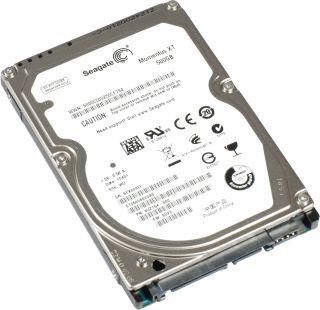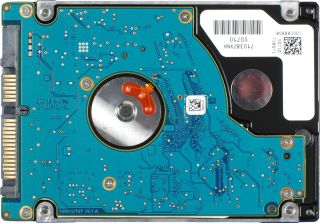Momentus XT Review: Seagate's Marriage Of The HDD And Flash Memory
Update: with more real-world testing under our belts, Seagate's Momentus XT is receiving our rare Best of Tom's award for excellent performance. This new hybrid hard drive combines up to 500GB of storage and 4GB of flash memory to maximize performance.
HDD + Flash = Seagate Momentus XT
The hard drive component of the Momentus XT is based on Seagate's Momentus 7200 design. Therefore, you can get comparable capacities: Seagate offers 500, 320 and 250GB. Our test sample was the 500GB flagship, called the ST95005620AS. All drives are equipped with a large 32MB cache memory (don't confuse this with the flash memory). Compared to 8MB or 16MB cache on most other 2.5” drives, this is quite a step forward.

The new drives are based on a SATA 3Gb/s interface with NCQ support, and while some people might have expected a 6 Gb/s interface, we don’t believe this is an issue at all. In the end, there has only been one 2.5” flash SSD capable of delivering enough throughput to turn SATA 3 Gb/s into a potential bottleneck. This is not the case on the Momentus XT, as throughput is limited to 193 MB/s on the interface and 109 MB/s from the physical drive.
Temperature and Power
We like the temperature specifications that allow the drive to operate between 0°C and 60°C. The power requirement is increased, most likely due to the onboard 4GB flash memory. We measured 1.3W idle power on the Momentus XT versus 1.0-1.1W on the current 7,200 RPM 2.5” hard drive competition. Power at peak throughput reaches 3.1W, which is about the same as on conventional 7,200 RPM drives; power consumption in workstation I/O is similar as well at 2.4W. However, 2.0W during full HD video playback is too much. Other 500GB 7,200 RPM drives require between 1.1W and 1.7W here. The consequences can be found in the MobileMark test results, as the battery runtime on the Momentus XT decreases quite a bit when compared to the Momentus 7200.4.

Low Level Performance
Our typical storage benchmarks include throughput and I/O testing, application performance, as well as power consumption and efficiency runs. Since this might not be enough to do justice to the flash-enabled Momentus XT, we decided to also run SYSmark 2007 Preview and MobileMark 2007; we used the latter to get an additional performance result, as well as measure the impact on battery runtime on notebooks, which might be a buying decision for some users.
We measured peak throughput of 109.6 MB/s, which doesn’t sound like a lot by itself, but it’s actually as much as a 5,400 RPM 3.5” eco-friendly drive sends across the wires. I/O performance is typically superior to the other 7,200 RPM 2.5” drives at 120-140 I/O operations per second. Application performance in PCMark Vantage is great as well, although there are some PCMark sections in which the Momentus XT doesn’t necessarily shine. Explanation of some of the performance results can be found in the technology behind Seagate’s flash memory implementation, called Adaptive Memory Technology.
Stay On the Cutting Edge: Get the Tom's Hardware Newsletter
Join the experts who read Tom's Hardware for the inside track on enthusiast PC tech news — and have for over 25 years. We'll send breaking news and in-depth reviews of CPUs, GPUs, AI, maker hardware and more straight to your inbox.
Current page: HDD + Flash = Seagate Momentus XT
Prev Page Seagate’s Solid State Hybrid Drive Reviewed Next Page Adaptive Memory TechnologyMost Popular



